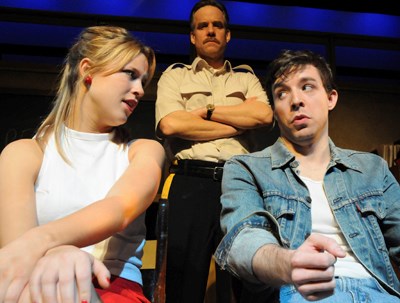By Scott Overton
Guy Vanderhaeghe is one of Canada’s literary lights. His first short story collection won a Governor General’s award, he got his second GG for his novel The Englishman’s Boy, and The Last Crossing was the winning novel in the CBC’s "Canada Reads" competition in 2004. Vanderhaeghe’s I Had A Job I Liked. Once. is the newest production at the Sudbury Theatre Centre. It was the winner of a Canadian Authors Association award in 1993. Both Sparks, and David Gingerich as Corporal Heaseman, are believable as RCMP officers. Tess Benger sets the right tone as the flirtatious alleged victim, Tracey Tolbertson.
Set in small-town Saskatchewan in 1967, the play focuses on the interrogation of young Les Grant, a boy very much from the wrong side of the tracks, for an alleged sexual assault on the daughter of the town’s affluent and powerful Crown Prosecutor.
RCMP Sergeant Jack Finestad is no friend of the angry father, but also a cop who’s lived his career by the book. So he’s determined to give the accused a fair hearing. That hearing is what the audience witnesses, sometimes as conversations, sometimes as reenactments of events.
The problem with this structure is how to reveal the characters’ backgrounds, especially Sgt. Finestad’s, which is crucial to explaining his ultimate actions. One of Vanderhaeghe’s solutions is a rambling near-monologue about Finestad’s conversion to Catholicism.
This and other moments of awkward exposition are portrayed as an attempt to bond with the accused before the tough questions start, but I just couldn’t believe that a cop would unload so much of his personal life that way.
The cast members, Stephen Sparks as Sgt. Finestad and Caleb McMullen, as well as director David Savoy, do what they can, but these scenes weaken the reality of the story.
And I was most impressed with Brian Paul as Tracey’s father — the play sets him up to be a villain, but Paul’s nuanced performance shows that his character’s behaviour isn’t nearly so black and white. The play would have benefited from more of that ambiguity.
Caleb McMullen as Grant, is a little too sympathetic, so the production makes a statement rather than forcing the audience into a more complex examination of our personal values.
Even so, questions about the difference between law and justice, and whether or not there is ever true equality under the law, are as valid today as ever. And the only way for them to be resolved is if we continue to re-examine them through our art and our literature.
It's a good reason to go to the theatre this month.
